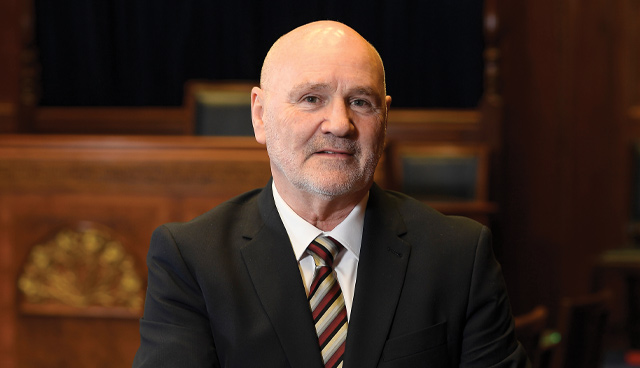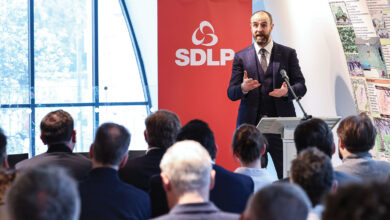Speaker: Alex Maskey

Speaker of the Northern Ireland Assembly, Alex Maskey MLA, talks to David Whelan about his elevation to the role, his adaptation to a move out of party politics and the impact of Covid-19 on Assembly business.
A party veteran with some 37 years spent in public office, Maskey, who has long been a key player in Sinn Féin’s negotiating teams, admits that taking on the role of the speaker was an “upending” of his usual position in the “cut and thrust of politics”.
The role of Speaker demands political impartiality, which Maskey explains, requires a commitment, especially for someone who has worn his party hat for so long.
“Following the reconstitution of the Assembly and the institutions, Michelle O’Neill asked me if I would take on the role if she proposed it and the Assembly endorsed it. I was fully aware that it was a new era that we were moving in to in January and that there would be significant challenges. I was also aware that the Assembly itself would be under very significant public scrutiny having not sat in over three years,” he says.
“There was little to consider. I was honoured to be asked and I was very keen to support the party and support the project of having a fully functioning Assembly and the other institutions. It is a completely different role from wearing the party hat. Independence and impartiality are the two bookends of the role. I had to have complete integrity in undertaking that and Michelle [O’Neill] has given me that responsibility and enabled me to do that.”
The Speaker’s role is multi-faceted, explains Maskey. In his procedural and most visible role, the Speaker chairs plenary sessions of the Assembly while also chairing the business committee, which is responsible for determining Assembly business. In his corporate role, he chairs the Assembly Commission, responsible for the proper provision of property, staff and services. Additionally, he has a representative role, receiving a wide range of guests to the Assembly, broadening public access through the hosting of events and being the external face of the Assembly at events outside of Parliament Buildings.
Procedurally, Maskey describes his role as one of responsibility to ensure that procedures in the Assembly are fit for purpose and function smoothly. With this, he credits the work of a large “engine room” in the Assembly supporting what the public often see on a day-to-day basis, including those staff working in the Speakers Office.
The Assembly Speaker role relies heavily on the advice of its staff and the value of those staff was brought home to Maskey during the early lockdown when he was forced to shield. “The senior staff and the officials who support the Office of the Speaker really came in to their own and helped ensure that the only thing that I wasn’t able to do in that period was to chair the meetings in the Assembly but I was able to take all of the other decisions.”
Wider than the Speaker’s Office, as Chair of the Assembly Commission, Maskey oversees some 350 staff with a significant budget of £40 million per year to run Parliament Buildings, employs staff and “essentially resources the Assembly to carry out its functions of scrutiny and holding the Executive to account”.
“The two key roles of the Assembly are to scrutinise legislation and to hold ministers in the Executive to account. They are things we take very seriously. The Assembly committees have a hugely important role in this regard and that initial work often manifests itself in the chamber but all of that has to be serviced by staff and officials, who ensure that that work is fully resourced,” he explains.
On his representative role, Maskey expresses a disappointment that Covid restrictions have seen the effective closure of Parliament Buildings to the public, stalling a trend of growing footfall over recent years. “It’s critical that the Assembly engages with the general public which we represent and that the public is given maximum access to the Assembly. That’s been a big disappointment this year but hopefully earlier in the new year we’ll be able to return to some degree of normality.”
Style
Maskey believes that little has changed in terms of the Speaker’s duties and functions since John Alderdice took the role following the Good Friday Agreement in 1998, however, he is aware that each Speaker tends to impose their own personality on the role. Asked to define his style, Maskey says: “I’m not one for standing on ceremony. I suppose I would be a bit more casual than some of the others. I prefer substance over style. I’m not the story and I don’t want the spotlight. That might seem odd to say as a Speaker, but my job is to make sure that the Assembly works as a unit. Yes, the buck has to stop somewhere, and I have to make decisions, but I like to think that I do that in conjunction with, and not over the heads of, the people I am surrounded with. I’m very lucky to have a high level of competence and professionalism within the staff.”

“I made it clear that whilst the Assembly would pare back some of its role at the time, that we would be returning as quickly as possible to full scrutiny and holding to account.”
He adds: “Each Speaker has left their mark and something I set out to do was to develop the role to more significant types of engagement with the wider general public. I wouldn’t have any concerns about taking some levels of engagement to the edge because we can be safe and secure and do the normal, but I believe the Assembly has to do a greater level of outreach to the public.
“The Assembly is still under public probation and so I want to make sure that we engage. We have a leadership role and a job to help reconciliation and therefore it’s quite right that the Assembly will quite often have controversial debates. However, I have insisted from day one that those debates will and must be consistent in respect for each member.
“People will rightly have their own political perspectives, but they must address those in a manner that is respectful. Members have to understand that what they do and how they do it impacts on the wider public perception of how the Assembly might work. In my opinion, we have to win the public confidence that the Assembly is a worthy enough institution to value their support.”
Covid-19
As well as closing the building to the public, Covid-19 has had a significant impact on the daily operations of the Assembly. Maskey explains that at the height of the pandemic it was agreed that the work of the Assembly would be reduced with the removal of all “non-essential business”.
Discussing the move, Maskey says: “I made it very clear as a Speaker on behalf of the Assembly that I have to guard the role of the Assembly in all of this. I made it clear that whilst the Assembly would pare back some of its role at the time, that we would be returning as quickly as possible to full scrutiny and holding to account. That’s our job to protect the Assembly role and I take that very seriously.”
Maskey states that the Assembly has been steadily moving back to that initial level of accountability and explains that where some work of the Assembly was scaled back, other areas where enhanced in relation to Covid, including the creation of a mechanism that brought Executive ministers before the chamber more often.
“As the Executive moved to daily press conferences, we initiated special committees. This effectively turned the Assembly in to a committee for the purpose of scrutiny and enabled us to bring ministers into the chamber much more often on a dedicated discussion on Covid.”

Maskey also oversaw a number of significant changes to the standing orders. Probably the most radical was the enabling of proxy voting. Current regulations mean that only 22 MLAs are allowed in the chamber at any one time and so change was required to move away from the traditional method of individual members physically entering the aye or no lobbies to cast their votes on motions or legislation. Instead, party whips were enabled to vote on behalf of their members with their consent on an opt in/out basis. Members were also enabled to participate in Assembly business through technology, which Maskey describes as a great boost.
However, some criticism has been levelled at the delay in the Assembly’s scrutiny of the restrictions brought forward by the Executive. In early November, the Assembly debated regulations putting in place a three-week partial lockdown just days before the regulations were set to expire, some elements of which had already been repealed. A number of MLAs criticised the situation, which the Executive defended by highlighting that the process was on agreed to by MLAs at the start of the pandemic.
Quizzed about the criticism, Maskey sates: “I would always want legislation to come before the Assembly. These restrictions have a big impact on people’s lives and livelihoods and a lot of personal freedoms were restricted to protect people’s health.
“These things aren’t easy, even in a single party government, and it’s been a learning curve. This Assembly gave the Executive the authority to make regulations and to introduce them and then for them to be retrospectively approved or not. Sometimes if the Executive has been nimble and acted quickly then new regulations are introduced that might render the previous ones redundant.
“I would always want legislation to be introduced [to the Assembly] quickly and to be given full scrutiny. It has to be the hallmark for the Assembly. That hasn’t always been able to be done given the nature of this virus which has been a public health crisis and the Executive has had to move fast.
“My job as the Speaker and our job as an Assembly is to hold all of that to account, so if it’s not perfect then I’m on record as engaging with the Executive to ensure that we do treat the Assembly with the full respect that it is entitled to and must have. I would say that has been improving.”
Accelerated passage
Within his responsibilities, Maskey has a scrutiny role in relation to the competence of legislation prior to the first and final stages of a Bill. Maskey accepts that there is a greater onus on this role given that every Bill that `has been enacted in the current mandate has done so through the use of accelerated passage, a process which skips the committee stage and can see a Bill pass in as little as 10 days.
“One of the main roles of the committees is that they are able to go through in fine detail all the elements of a Bill. This stage usually throws up questions and offers answers. If the system works well, then the relevant minister will be working with the committee to take on board issues and concerns and seek to address them. It means that by the time the Bill is coming to the chamber a lot of the issues will have been aired and a lot of evidence will have been built up. That’s important when I’m selecting amendments on the basis of the legal and procedural advice I’m given.
“So, yes, it puts more onus on the Speaker to make sure you’re allowing the right amendments to be tabled against any Bill or in support of it and yes, there is a greater spotlight on the Speaker’s role because the members of the Assembly wouldn’t have had the benefit of a committee session.”
Private Members’ Bills
Traditionally, the Northern Ireland Assembly does not have a strong track record in facilitating non-Executive Bills. Maskey is aware of this and says that he is very pleased that in 2020 the Assembly signed off on an enhanced service for Private Members’ Bills, providing additional staff and resources which he believes will give non-Executive MLAs a much greater opportunity to be able to create and pass legislation.
“There are members who are not chairs of committees or who are not ministers and who might never be, but as a member of a legislative assembly must have an equal right to legislate. What we have done is make the process simpler and increase the support of those MLAs. A number of Private Members’ Bills are currently live and I’m very pleased that this Assembly, even with its short lifespan, will probably pass more Private Members’ Bills than any previous Assembly,” the Speaker says.
“A number of Private Members’ Bills are currently live and I’m very pleased that this Assembly, even with its short lifespan, will probably pass more Private Members’ Bills than any previous Assembly.”
Maskey accepts that the short lifespan of the Assembly, with the next election set for May 2022, is a hinderance. Following the return of the institutions in January 2020, the five main parties, through New Decade, New Approach, committed to passing a lot of legislation, some of which has now been set back. Maskey outlines that every department has been disrupted by efforts to tackle the virus.
Highlighting that the last year of any Assembly mandate tends to be extremely busy he believes that work ahead of this Assembly will be particularly “frantic”. “Our job is to manage that as best as we can and in engaging regularly with the Executive, to ensure that we have a legislative programme that will keep us all busy,” he adds.
Brexit and the volume of legislation necessary to mitigate any change will undoubtedly add to the time pressures of the Assembly. “I have no doubt that we will have a tough job but that’s what we are there to do. We will have Brexit implications and there will be a lot of legislation to deal with that,” agrees Maskey. “Additionally, coming out of Covid there will be a greater expectation from the public that we deal with other areas of government policy and address their concerns.”
Future
Maskey has no interest in talking about his legacy as Speaker, instead stressing that he is focused on the work committed to under New Decade, New Approach. Admitting that he still has to pinch himself as a reminder that he is not a party politician at this time, he hints at a return to this role in the future.
“I live in and represent West Belfast and I’m proud and honoured to be able to do that. I’ll do that as long as I’m able and as long as the constituency and my party colleagues want me. However, for now, I’m exclusively focused on what I’m doing in the Assembly at this moment in time. There are not enough days in the week for me to do what I would like to in this role, but I will cram in as much as I possibly can,” he concludes.






